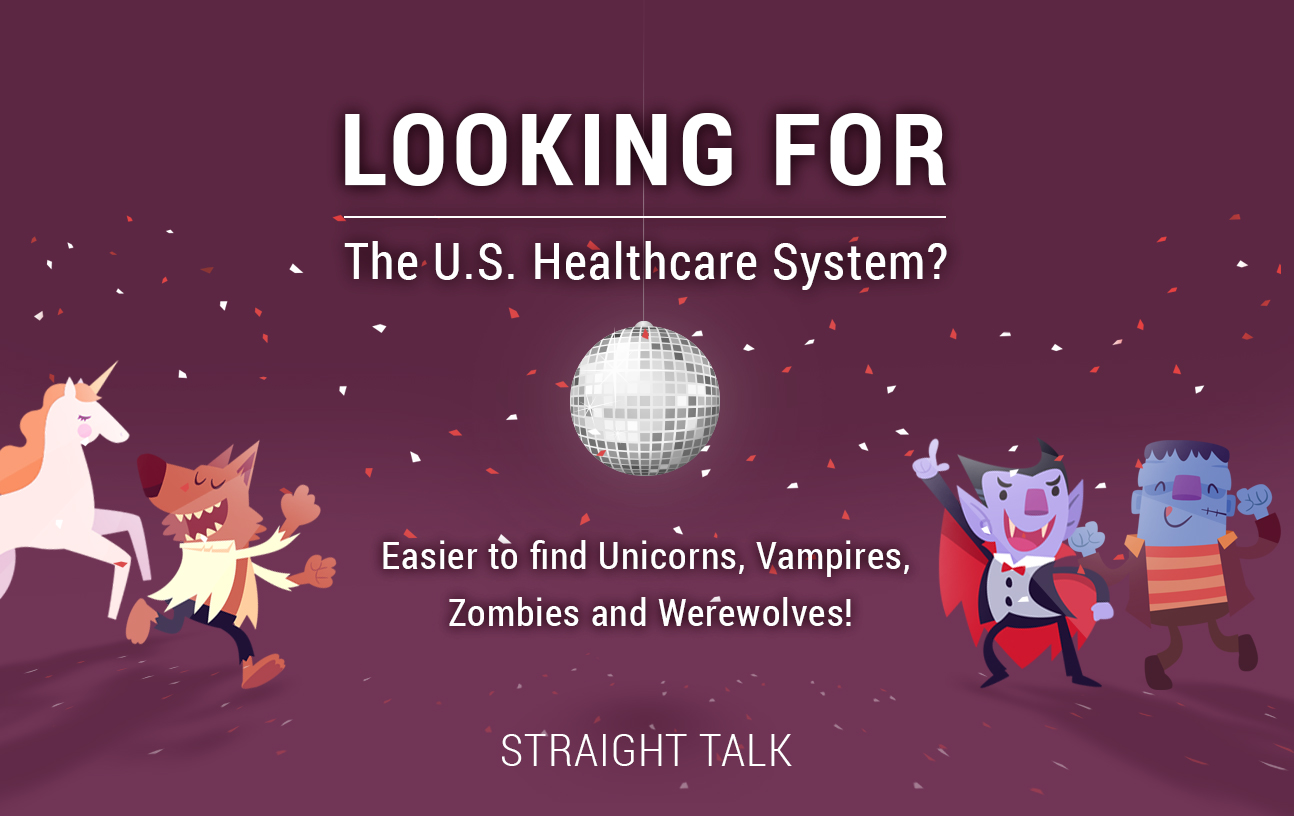I’m always struck by the amount of time, energy and literature that is devoted to creating alternative worlds, with alternative goals, objectives and creatures. Next time you wander through your local bookstore, pay close attention to how large the Fantasy sections are, and you’ll start to get a feel for the level of effort. Did you know some 3,000 years ago Greek literature described the first unicorn as a native of India?
Similar levels of effort seem to be generated all the time to resolve problems with healthcare in the United States. Real, honest, doable solutions, much like vampires, never seem to come out in the daylight. I’ve come to believe there are some simple reasons for this phenomenon.
The “Healthcare System” is a Mythical Creature
Healthcare cannot be treated as a system. Why not? I mean, we always talk about the “healthcare system” as if it is a real thing. Unless healthcare assumes this form by the light of the full moon like a werewolf, and I just missed it, there is no such thing. Disagree?
Review Merriam-Webster’s definition of the word “system”:
“a regularly interacting or interdependent group of items forming a unified whole”
Anyone who has worked in any area of U.S. healthcare for more than a few days knows that what we call “healthcare” does not approach this definition even vaguely. In no way is healthcare in the U.S. a “unified whole.” Yet the words persist, much harder to kill than any zombie, and we read them all the time: “healthcare system.” If I could cut the head off this trend, I would have done it already.
Now Mike, is that any way to talk? Anyway, what difference does it make WHAT we call it?
It’s critical. Because we are all victims of this group-think where we call healthcare a “system,” we consistently think system-type solutions will solve the problem. Do you feel like your healthcare is a good value today? Or your insurance is a good deal? Can you afford it? Are you paying a fair price? Do you have any idea how much any part of your care costs before you use it? I’m betting no.
Such assumptions are evident when a party in power decided to make “sweeping changes to the healthcare system.” The larger and more comprehensive such bills become, the more likely they are to fail.
Healthcare financing is a bit of a zero-sum game. At best, you can influence who are winners, and who are losers. And there are always winners and losers. Any effort to “repeal and replace” the ACA will ultimately have the same problems. It’s a system solution to a non-system.
“After days of retreat-type meetings, the Republicans, who now control the White House, the Senate and the House, began to introduce healthcare bills to repair the problems we identified with the ACA years ago.”
So why don’t we all just admit that we made unicorns…eh….the words “healthcare system” up, so we can move on to real fixes that will help real people? For maximum success with minimal negative impacts on real people we should focus on incremental fixes that will make a difference NOW, not in some far-off future time and place. Here at Blue Cross, we have embraced this concept and are moving forward with programs like Quality Blue Primary Care. It’s making a difference, one primary care doctor at a time.
Fixing the Beast
The ACA made a really big attempt to “re-system” the whole individual market. Was it too big in scope? Maybe. Was it wrong to jam it through with no bipartisan support? Probably. Was it poorly executed and enforced in most states? Definitely. Can it be fixed, or should it be replaced? I say “fixed.”
But Mike, all the problems with the ACA! Are you saying “let it ride”?
Not a chance. If you have followed me at all, you know the incremental changes the federal government and Congress could make to stabilize the individual market and stop the runaway train of rate increases.
And finally, some good news
After days of retreat-type meetings, the Republicans, who now control the White House, the Senate and the House, began to introduce healthcare bills to repair the problems we identified with the ACA years ago. These are some of the same problems that are forcing premiums to skyrocket, punishing the young and healthy, and allowed people to wait to buy coverage until after they are sick. I’ve already written about these specific issues.
These bills are a tacit admission that healthcare is not a system and thus not subject to system-level solutions at this time. They are good for those who purchase health insurance both on and off www.healthcare.gov, and have the potential to curb rate increases.
It takes real humility to admit that you don’t have all the answers, something I’ve found far too rare among those who deal with healthcare in Washington D.C. For those who continue to believe they have all the answers, I have to ask whether they prefer unicorns, zombies, vampires or werewolves, because that is the level of reality they are dealing in. Or, to put it another way:
“If any man you meet tells you he understands our United States Healthcare as a system, he knows how it works and has all the answers, then you have either met a fool or a liar.” (Walter Williams, Economics Chair at George Mason University, live on-air 2005)
Dr. Williams clearly understood that healthcare is not a system, but people are hurting and suffering now, and we need to focus on fixing the things we can fix, minimizing disruption and getting all the players to start acting like partners, and not competitors.
That’s how we’ll improve the health, and the lives, of all Louisianans (Which is Blue Cross and Blue Shield of Louisiana’s mission, by the way).
How Will the Story End?
These new bills are a good start. They attack specific issues that are driving up the cost of people’s health insurance and driving carriers out of healthcare.gov in many states. They have the potential, if enacted, to begin to stabilize the market and draw more competition into it.
That is, assuming they are acted upon. It’s all in Congress’ hands now. We must be vigilant and not be distracted by unreality, we must stay focused on what matters: Real healthcare for real people. The storybook hero here would be partnerships on both sides of the aisle, which will save the day. Stranger things have happened, after all.
Hope that’s straight enough for you.





Leave a Reply